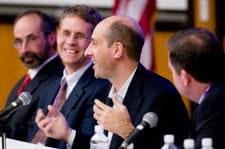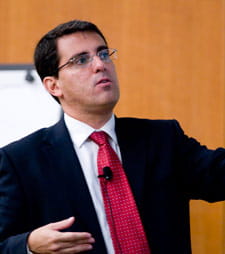Practitioners must take a renewed interest in risk management and develop better models to mitigate future financial crises
11/21/2008 - In finance, risk is intimately related to reward, but lately too many investors and executives tended to downplay the downside of making a business gamble.
 |
| A panel at the Nov. 20 Kellogg Risk Summit included, from left, Steve Lindo, executive director, PRMIA, a co-sponsor of the event; Mitchell Petersen, the Glen Vasel Professor of Finance; Sergio Rebelo, the Tokai Bank Professor of International Finance; and William Quinn ‘91, managing director, Goldman Sachs. |
| Photo © Nathan Mandell |
 |
| One of three presenters at the Nov. 20 Kellogg Risk Summit, Marcelo Cruz, former chief risk officer of Aviva, discussed tools and frameworks for managing risk, with a focus on the lessons afforded by the current financial crisis. |
| Photo © Nathan Mandell |
That was one insight that emerged during the Nov. 20 Kellogg Risk Summit as experts discussed the drivers behind the recent financial markets meltdown.
The event, which occurred at the James L. Allen Center, was sponsored by the Zell Center for Risk Research in conjunction with PRMIA, the Professional Risk Managers’ International Association.
| |
 |
Related Video |
| |
William Quinn |
|
|
|
This video is password protected for the Kellogg Community | | |
| |
|
| Participants expressed broad agreement that business leaders need to take a more serious, and sophisticated, look at risk management. Too often in recent years, they said, executives, in part driven by market pressures, focused narrowly on performance and quarterly returns. As a result, risk management tended to be a secondary consideration. Worse, according to Ali Samad-Khan, who delivered one of three presentations at the half-day summit, there often is confusion about the fundamental nature of risk itself.
Risk is a “nebulous” concept, not well understood by senior managers, he said, adding that defining the problem is not just a matter of semantics, but part of developing a viable solution.
Samad-Khan, a principal and global leader in the operational risk consulting practice at Towers Perrin, said that the risk models employed by many firms helped create the current liquidity problem in the financial markets. He argued that traditional models, which he defined as being preoccupied with high-probability/high-impact events, are tactical in nature and focused on “preventing the next business loss.” While this is an important concern, he acknowledged, the model in his view is fundamentally flawed and is not properly a risk management tool. He said that modern models consider risk — a neutral measure of uncertainty, in Samad-Khan’s terms — from a strategic standpoint, including examining the potential for high-impact but low-probability events.
He advised business leaders to factor risk into their planning and to remain aware that a decision made based on “accounting profitability” will define risk significantly differently than a decision made after considering “risk-adjusted profitability.”
Samad-Khan, introduced by Kellogg Senior Lecturer Russell Walker as “a world-recognized leader in operational risk,” also emphasized the need to parse the very “taxonomy” of risk, paying careful attention to various kinds of risk, such as endogenous or exogenous strains. He identified the three key risk categories as “causes, events and consequences,” and said that a “robust taxonomy provides a foundation for a common risk language,” noting that these categories overlap. The practical implications of getting this taxonomy correct are significant, he said, as they suggest dramatically different managerial strategies. For example, a controllable factor internal to a business is addressed differently than a threat that is external to the firm, Samad-Khan said.
He offered several remedies for lax risk management practices, including addressing principle-agent and incentives problems within a firm, something he called “probably the most significant risk.” Too often, he said, incentives are aligned in a “heads I win, tales someone else loses” fashion, which leaves managers free to take excessive risks. Incentives should be changed so that managers share in the upside gains, but also are responsible for losses. Other ways to offset these challenges, he said, was to ensure that the CEO and the board of directors are sufficiently knowledgeable about risk management and its importance to the overall enterprise. Also, performance must be measured on a risk-adjusted basis, “otherwise a risk arbitrage situation will exist.”
Samad-Khan said that analytical modeling is an important part of risk management, but cautioned that these models only predict what is available in the data. “They cannot predict what’s outside the dataset,” he said.
Also speaking at the Risk Summit was Leo Tilman, president of L.M. Tilman & Co. and former chief institutional strategist at Bear Stearns. Tilman discussed themes related to his new book,
Financial Darwinism, a subject that he also introduced on Nov. 19 at the Kellogg Finance Conference. Managing risk, he said, is about adapting and evolving as a business. Tilman stated that as more firms work with what he called a static view of profit models, it makes responding to a dynamic world difficult. Further, he said that these poor overarching models were mostly to blame for the financial crisis, rather than investor or managerial “greed and complacency.” In this, his view differed somewhat from Samad-Khan who acknowledged both “flawed models” that a “precocious four-year-old could have figured out,” as well as broader culpability related to incentive structures and an overall business environment that emphasized profitability above all else.
The Risk Summit also featured insights from Marcelo Cruz, senior risk management consultant and former chief risk officer of Aviva. He was also global head of operational risk analytics and quantitative risk analytics at Lehman Brothers. Cruz pointed out that only about a decade ago did firms really begin focusing on operational risk management. He provided a glimpse into the challenges of managing risk at Lehman, which filed for bankruptcy protection in September. Cruz said that risk governance and incentives were key problems at his former employer; because of the financial incentives in operation, he said it proved very difficult to convince managers to reduce their investment leverage. Even his own salary bonus, said Cruz, was contingent upon the performance of the frontline practitioners making deals and taking risks. Today, he said, risk management should continue changing its focus from being considered “a cost of doing business” to a function that is involved in “value creation” for the firm. He said that companies need “parallel processes” to manage risk, alongside existing processes that manage profitability.
The summit concluded with a panel discussion featuring Kellogg School experts, including Sergio Rebelo, the Tokai Bank Professor of International Finance; Mitchell Petersen, the Glen Vasel Professor of Finance; William Quinn ’91, managing director, Goldman Sachs; and Steve Lindo, executive director, PRMIA. Moderating the panel was Walker, assistant director of the Kellogg Zell Center for Risk Research.
Among the several questions the panel fielded from the audience, one was concerned with what an attendee called “some contradictory explanations” for the root causes of the financial meltdown. Some experts, said the attendee, blamed poor modeling, while others said greed and limited oversight were at fault. In response, Rebelo said the question of causes was very difficult: “This is a complex crisis with many elements. It takes a while to unravel the complexity because there are very interconnected elements.”
Petersen said, “Greed’s a great answer. Greed and fear, but I’m loath to accept these [at face value] because they simplify [the problem] in an unuseful way.” When asked what most worried him about the crisis now, Petersen said it was potential regulatory fallout that could emerge over the next 12-to-24 months, new rules made hastily that “we’ll then have to live with for the next 20 years.”
Adding to the difficulty of sorting out the crisis is the fact that “we’re right in the middle of a giant firestorm,” said Lindo, who added that practitioners and scholars must “continue the discussion” if they hope to achieve a new and better model for mitigating risk. He also suggested that the crisis could deepen if life insurance companies — the potential “next shoe to fall” — show weakness in their ability to meet their commitments. Others, including Rebelo and Walker, pointed out that the credit card industry could suffer some weakness, although other concerns, such as those surrounding deflationary trends, were dismissed as being unlikely to create major problems.
“Deflation is overrated. It’s not a big deal,” Rebelo said.
As serious as the crisis is, Rebelo tried to provide some broader perspective. “We don’t really have experience with events of this magnitude,” he said. But he emphasized that the nature of today’s global markets offer opportunities for some countries to do “fine” even as others, such as the U.S., located in the “epicenter of the crisis,” fare less well. “It’s not like the whole economy is going to collapse,” Rebelo said. The panic currently seen in the markets is largely related to volatility, he said.
Walker, the principal organizer of the Risk Summit, said the Kellogg initiative offered an excellent forum for experts to advance the dialogue about a critical business issue.
“The trend toward greater globalization and complexity on business and business relationships continues to grow,” said Walker, who is also a senior lecturer in the Kellogg School’s Managerial Economics and Decision Sciences Department. “It is clear that winners in the world of business (not just banking) will be those that manage risk better. Indeed, managing risk is about managing information. The expectation on executives is to manage more and more complex information going forward. This is part of why the Zell Center is committed to bring together the rigor of academic research and the relevance of expertise from leading practitioners.”
Walker also noted that the Zell Center intends to produce additional events focused on risk management. “To prevent repeating the financial crisis, a new focus on risk management is needed, one that required shareholders, regulators, employees and business partners to seek information on risks and make decisions on that information, not simply on short-term earnings. Our summit demonstrated the importance of that.”






